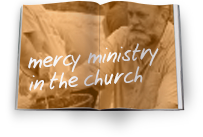How to Start a Mercy Ministry in your Church
If you want your church to help poor people, just decide how you are going to help, find people to serve, start serving, and tell them about Jesus as you serve.
Okay, I admit that there is a little more than that to starting a mercy ministry. At Guilford Baptist Church, just two years ago we launched a ministry that includes a food pantry and reaches out to homeless people and at-risk youth. Based on our admittedly brief experience, we have developed a long list of “things to do” and “things not to do” when starting a mercy ministry. Our three most important “to-dos” are to decide how you are going to serve, find people, and preach the gospel.
DECIDE HOW YOU ARE GOING TO SERVE
Low-income people have many different needs, and people will likely ask for help you cannot give them, so it is important to decide how you are going to serve your community. You need to define what services your church will offer.
At Guilford, we have at times overextended ourselves trying to respond to too many needs at once. People became frustrated that we could not help them, and our main goal of sharing Christ sadly took a back seat. So we have found it helpful to create a referral list of other organizations and agencies in our community that can help in ways our church cannot.
In order to decide how your church can best serve the poor in your community, pair the strengths of your church body with the needs of your community.
Is your church full of families? Get the children involved in serving. Perhaps you can contact your public schools and ask how to serve needy children there. Or, offer to tutor low-income students and then invite them to Bible studies.
Do you have great counselors in your congregation? Start a Bible study for substance abusers or young pregnant mothers.
At Guilford, we started a food pantry because we are surrounded by Spanish-speaking people who do not qualify for food stamps. So we collect non-perishable donations and household products from local churches and grocery stores, and we distribute groceries on the third Saturday of every month after a brief evangelistic service.
Once you decide what to do, contact organizations who offer similar services to get ideas of how to structure your ministry. There’s no need to reinvent the wheel.
FIND PEOPLE
Probably the most important thing to do in starting a mercy ministry is connecting with people. A church can have shelves of free food and clothes to offer and still not have a mercy ministry. So find needy people by telling other organizations and agencies in your area what your church wants to do. Contact your local social services departments, nonprofits, community centers, and public schools. Send details about your services so they can spread the word. Note high crime areas in your city and drop off fliers there.
Finding people is not always comfortable. It did not feel comfortable when we went to day laborer sites to hand out fliers about our food pantry. It did not feel comfortable, at first, to hang out at the homeless shelter. It is sometimes awkward to knock on the doors of strangers to offer them free food and an invitation to Bible study, like one of Guilford’s Hispanic pastors does. But it is remarkably exciting when some of these people show up to church and Bible studies and we get to share with them the good news of what God has done in Christ to save sinners.
I remember getting a call one night from a homeless woman. She said that if we did not come get her, police officers were going to take her to jail for the night because the shelters were full. Guilford’s friendship with that woman eventually blossomed into a whole ministry at our local homeless shelter.
PREACH THE GOSPEL
Most importantly, use your mercy ministry to pursue the lost with the gospel. This is what distinguishes Christian mercy ministries from social programs that anyone else can provide.
So push into broken lives with the healing message of the cross whenever you can. This means making the effort to really get to know needy people. Many of the people we serve at Guilford are illegal immigrants and live in fear of being deported. Several of them are single mothers who have suffered intense abuse. Some are addicts. A handful of our contacts live in tents throughout our community.
Because of the kind of lives the needy typically live, they are often uncomfortable walking into a church for help unless they are warmly invited. So encourage people in your church to lovingly welcome the poor into your midst by having them share specific ways church members can serve and pray for the needy people who come into contact with your ministry (with sensitivity to privacy).
At Guilford we use a database to regularly update files of people we help. We also keep lists of volunteers and donors. When needs or prayer requests come up, we e-mail them to supporters. It also may be helpful to create an internet presence with a blog or Facebook page to help you keep people informed and excited about the ministry.
WORTH THE WORK
Although it poses many challenges, starting a mercy ministry can be a pretty straightforward process. And although the sin and brokenness of this world often make mercy ministry uncomfortable and challenging, praise God that he uses our efforts to provide for others’ needs and to the spread the gospel which radically changes and redeems.








